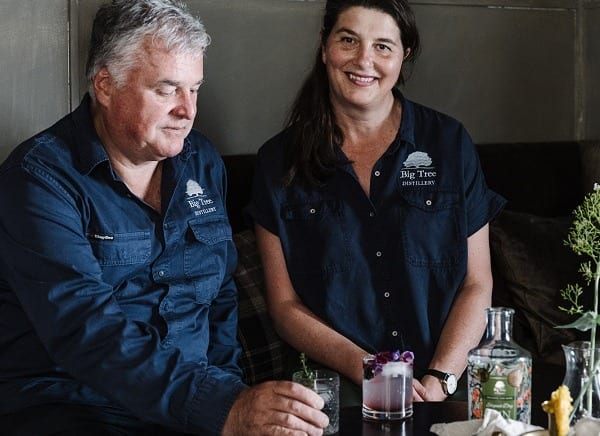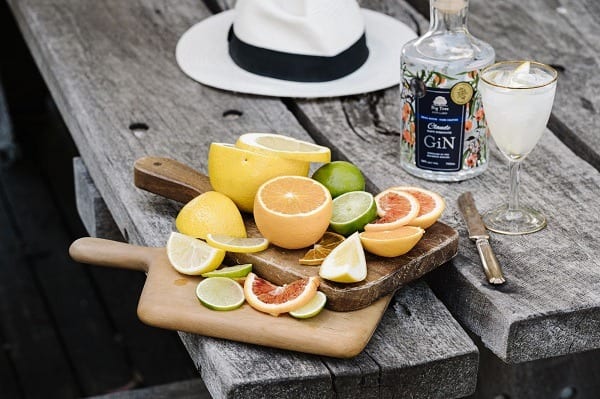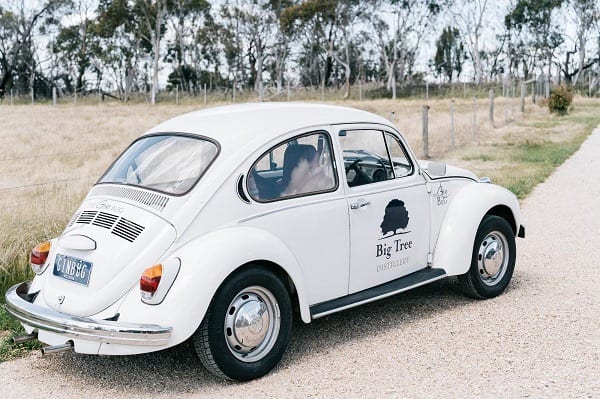A stressful job in media advertising and a life-threatening health crisis prompted former corporate high-flyer, Catherine Crothers, and her husband Gary Jago to quit their lives in inner-city Melbourne for a more low-key life in country Victoria.
Crothers, originally from Tasmania, met her now husband, Gary – a former marine engineer and self-confessed “jack of all trades” – in 2007. At the time, he had undergone treatment for stage 4 bowel cancer then was hit with necrotising fasciitis, which put him into a coma.
“I was 45 kilograms and so very ill,” Jago says. “We both knew that something needed to change.”
It’s hard to imagine that 13 years down the track, this same couple are celebrating winning Best Classic Gin for its Elegant Dry at the World Gin Awards in London for their business Big Tree Distillery. Overall global winners will be announced on February 27.
********
Work in agriculture or have aspirations to do so? Sign up to The Ag Wrap, our weekly update for women in agriculture.
********
“We’ve tried to source the best produce and the best equipment to help us achieve just the right balance of flavours and finish to our traditional and signature botanical gins,” Crothers told Women’s Agenda. “It’s great to see our gin doing so well internationally.”
It was the realisation that “life is just far too short” that spurred them into starting a new life in the country. Crothers distinctly remembers drawing a circle around Melbourne representing a 100-kilometre radius – the maximum commutable distance from the CBD, in her opinion. She and Jago then spent every weekend visiting small towns that met their criteria.
Newham, Victoria, about 78 kilometres from the Melbourne CBD was the place they settled on. In 2010 the couple moved to an 80-acre property, Jack Springs Farm, in Newham.
“When we moved all that was here was a water tank, some cattle and shed,” Crothers says. “We lived in that shed for eight months – it was pretty rustic’.”
It was one night in 2013 while sharing a gin and a whisky with Jago that they had the idea. “I think we said: ‘I wonder if we could make whisky?’, but that took a long time to make. One of us said: ‘well, what about gin then?”
The pair had already planted 500 olives on their property and were already producing and selling lamb through their farm. Adding gin – which had not yet experienced the revival it enjoys today today – production to their business venture seemed feasible. But it took two years of research before they could produce the spirit on a commercial level.
“The goal was simple: we wanted to make gin that we liked to drink ourselves.
“We bought a pressure cooker from IKEA and tried to make a type of still – we worked out we could do it, not very well, but we could do it,” Crothers says.
They were hit with a hurdle when they were told by German-trained boilermaker, Knapp Lewer, that their copper still would take two years to build, as well as a hefty investment.
“We call her [the copper still] Beryl,” Crothers says. “She is a huge part of what we do here and how we do it.”
After bottling its first batch of gin in June 2018, Crothers and Jago invited prominent wine makers to come and taste and review the product. They needed objective, professional opinions, because “every friend you ask will tell you your product tastes good, it is what friends do!”
The winemakers loved it, and before long Big Tree was winning awards all over the world, such as a gold medal at the San Francisco World Spirits Competition.
But gin-making and the experimentation that goes with it hasn’t always gone smoothly. The pair decided to make a cumquat-infused gin, which produced a “disastrous, revolting gin” that was basically un-drinkable. They poured the failed product back into the still with the intention of returning it back to pure alcohol – a process that removes the previous flavour. As the gin went through the still for a second time, they tasted it and were “blown away”. “The second distillery process created this beautiful, fresh cumquat flavour – and so our double distilled cumquat gin was born.”
Big Tree’s product design is a testament to Crothers’ marketing and advertising background. She did her research, and knowing the gin market is largely female, she approached a local artist Sarah Gabriel, to create four beautiful botanical artworks for the French made glass bottles.
Crothers has found that the cool, dry climate of the Macedon Ranges, close to Hanging Rock, is also a good place to grow juniper berries. Big Tree has about 60 juniper trees, which will take some time to mature. Currently most juniper berries used in Australian gin production come from Eastern Europe. Crothers hopes that someday Big Tree will grow enough berries to sustain their own gin production.
“My advice to women is that if you have an idea and some fire in you to try something new, give it a go,” she said. “You just never know what is around the corner.”




